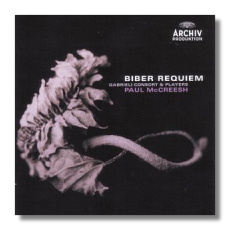
The Internet's Premier Classical Music Source
Related Links
-
Biber Reviews
Lassus Reviews - Latest Reviews
- More Reviews
-
By Composer
-
Collections
DVD & Blu-ray
Books
Concert Reviews
Articles/Interviews
Software
Audio
Search Amazon
Recommended Links
Site News
 CD Review
CD Review
Heinrich Ignaz Franz von Biber

Requiem
- Heinrich Ignaz Franz von Biber:
- Requiem in F con terza minore
- Missa ex B à 6
- Orlandus Lassus:
- Ave verum corpus à 6
- Media vita in morte sumus à 6
- Georg Muffat: Ciacona
- Johann Heinrich Schmelzer:
- Sonata II
- Sonata XIII
- Abraham Megerle: Peccator et consolator à 2
- Anonymous:
- Praeludium legatura
- Praeludium
Gabrieli Consort & Players/Paul McCreesh
Archiv 474714-2 DDD 81:06
McCreesh always manages to come up with imaginative recreations of music from before the time of Bach, and this CD, with its fanciful subtitle "a Requiem for Biber," is no exception. (There's no evidence that Biber was writing the Requiem recorded here for himself, however, as some fancifully claim Mozart to have done, at the end of his life.)
Heinrich Ignaz Franz Biber died three centuries ago, in 1704. (He was born in a town in Bohemia in 1644, so he lived approximately two generations before Johann Sebastian Bach.) Like Mozart, he became closely associated with musical life in Salzburg through appointments for that city's archbishop. The major works on this CD are Biber's Missa ex B à 6 (six-part Mass in B) and his Requiem in F con terza minore (Requiem in F minor). As limited information has been passed down to us concerning how these works were performed, McCreesh has opted for great contrast between the two. The Mass is given an intimate treatment (in his booklet note, McCreesh writes of the "almost bucolic" organ continuo). In this performance, there is one voice to a part, with the exception of the two soprano parts, which are doubled. Apart from the organ, the only other instrument is a bass violin. Furthermore, McCreesh inserts music by other composers in between the movements of Biber's Mass. For example, violin sonatas by Johann Heinrich Schmelzer serve as the Gradual and "Deo gratias," and Orlando di Lasso's beautiful "Ave verum corpus" is used for the Communion.
In contrast, McCreesh performs the Requiem in such a manner as to inspire – forgive me – "shock and awe." a 5-voice ensemble of vocalists is contrasted with a ripieno group of twice as many voices. The instrumental ensemble consists of seven string instruments, three sackbuts, and two organs (as with the voices, solo and ripieno). At times the cumulative sonorities are almost overwhelming. In his instrumental music, Biber was renowned for his use of scordatura, or alternate string tunings. These usually apply to violins, but here, McCreesh has experimented with retuning the violas as well, claiming that the resulting sonorities are much more satisfying and better balanced. In contrast to the Mass, the Requiem is performed without interruption as a nearly half-hour "wall of sound," if you will. The disc closes with di Lasso's moving Media vita in morte sumus (In the midst of life we are in death), a fitting close to this program. McCreesh's performance seems determined to add Biber's Requiem to the other great works in that genre, including, yes, Mozart's. At times, McCreesh's forces seem almost in danger of running away with the music. It is a pleasure, though, to hear this music played in so ballsy a fashion. McCreesh's scholarship is not in doubt, yet the performance bears no traces of dryness or unwonted caution.
The recording was made in the Tonbridge School Chapel in Kent – apparently a rather noisy venue. (Is that an air conditioner I hear in the background, or simply the breathing of the two organs?) Apart from that, the sound is fine. And what about this CD's playing time? How is that for getting your money's worth?
Copyright © 2005, Raymond Tuttle


















